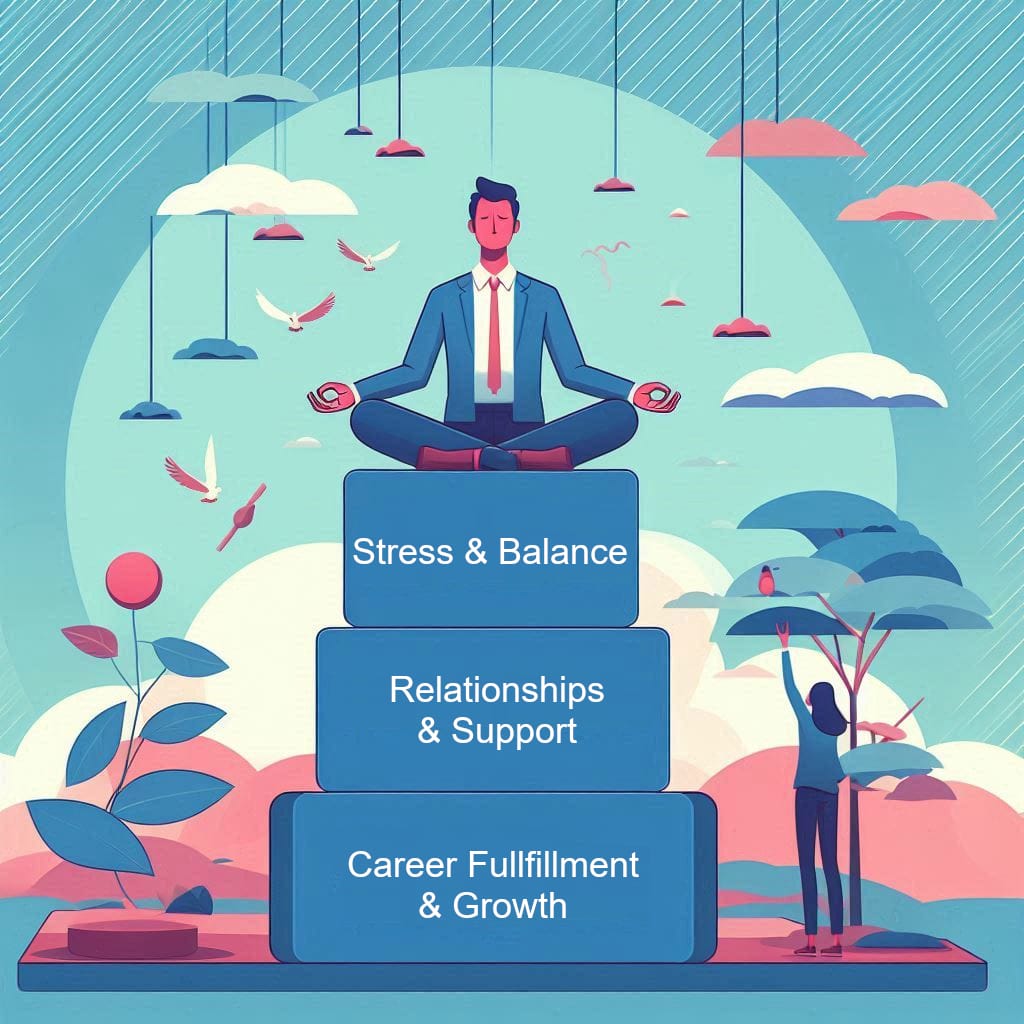
Workplace mindfulness is the practice of being present and focused during work hours. In today’s fast-paced work environment, workplace mindfulness is more important than ever. However, a staggering 77% of workers reported experiencing work-related stress in the past month, according to a recent survey by APA. As a corporate worker, you’re likely all too familiar with the pressures of managing multiple projects, meeting tight deadlines, and staying on top of your career goals. Whether you’re facing constant stress, feeling disconnected from the purpose of your work, or experiencing stagnation in your career, these challenges can take a toll on your mental wellness. The stress mounts, the sense of fulfillment fades, and before you know it, burnout creeps in.
How to Measure Workplace Mindfulness?
“Where do I stand?” you might ask. While there is not a consensus on how to measure personal well-being and career success, most researchers and coaches suggest three key pillars: Stress & Balance, Relationships & Support, and Career Fulfillment & Growth. These three pillars, when taken together, provide a full picture of your mental wellness. They go beyond just managing stress or career growth in isolation. They intertwine, showing how your work-life balance affects your stress levels, how your sense of purpose impacts career fulfillment, and how supportive relationships enhance your well-being and productivity.
Stress & Balance
Stress is a constant in today’s corporate world, especially for those working in fast-paced environments. When stress becomes overwhelming, it can lead to burnout, anxiety, and even physical health issues.
Maslow’s Hierarchy of Needs emphasizes that stress reduction is crucial for fulfilling basic human needs like safety and emotional stability. Similarly, the Job Demands-Resources (JD-R) Model suggests that high job demands without sufficient resources can lead to burnout. Self-Determination Theory further depicts the importance of having control over one’s work and managing stress for optimal psychological well-being.
What it covers:
- Stress management
- Work-life balance
- Emotional well-being
Relationships & Support
It’s easy to forget how much relationships at work matter when you’re focused on tasks and deadlines. But having strong, supportive relationships with colleagues and managers is key to reducing stress and promoting career satisfaction. A lack of support can lead to feelings of isolation and burnout.
As Maslow’s Hierarchy of Needs teaches us, social connections, belonging, and support are essential for emotional well-being. Social Cognitive Career Theory also emphasizes that perceived support from others is a major predictor of career success. In addition, PERMA (Positive Emotion, Engagement, Relationships, Meaning, Achievement) highlights the importance of relationships as a core element of mental wellness and overall happiness.
What it covers:
- Communication quality with colleagues and leadership
- Sense of support from coworkers and managers
- Workplace camaraderie and teamwork
Career Fulfillment & Growth
For many corporate professionals, career growth feels like a distant goal. There’s the ambition to progress, but often it feels like you’re stuck, plateauing in your current role. At the same time, a lack of fulfillment can lead to frustration, disengagement, and even career dissatisfaction.
This pillar builds on Holland’s Theory of Career Choice, who emphasized the importance of aligning careers with personal interests and values. Other researches, including Social Cognitive Career Theory, highlight the role of self-efficacy in career fulfillment, suggesting that belief in one’s abilities can drive motivation and success. Additionally, the concept of Career Adaptability underscores the importance of flexibility and adaptability in navigating evolving career landscapes.
What it covers:
- Career development
- Job satisfaction
- Alignment with long-term career goals
Quantitative Tracking for Meaningful Change
While understanding these three pillars is crucial, it’s equally important to quantify your mental well-being to gain a clear picture of your current workplace mindfulness. By tracking your progress over time, you can identify potential risks and take proactive steps to address them. This data-driven approach empowers you to make informed decisions and witness tangible improvements in your personal and professional life.
davoci offers a unique solution to this challenge by providing a corporate mindfulness tracker. By evaluating your conversation transcripts and leveraging insights from past sessions, davoci quantitatively measures your progress across the three key pillars. This allows you to visualize your journey and identify areas where you may need to focus more attention. With davoci, you can gain a deeper understanding of your mental health and take control of your well-being.
davoci is your 7/24 partner in workplace balance and career growth. Speak with davoci to relieve work frustrations, uncover root causes, and get tailored strategies that boost your mental wellness and career success!